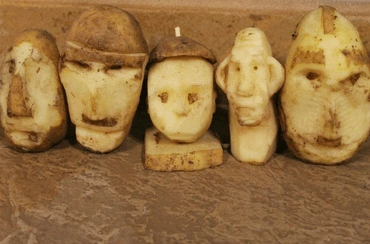9656. 'And they shall be paired from below, and at the same time paired up to its head' means a joining together from without and from within. This is clear from the meaning of 'being paired' as being made to act jointly; from the meaning of 'from below' as from without, since the Word portrays what exists outwardly as that which is below, and what exists inwardly as that which is above, 3084, 4599, 5146, 8325 (so that things deep down are more outward and those high up more inward, 2148, 4210, 4599); and from the meaning of 'the head', in the expression 'from below up to the head', as from within. The reason why 'the head' has this meaning is that the head is above the body, and by things above are meant those that are inward, as has just been stated; and in addition to this a person's inward powers are located in the head, for in it reside the beginnings of the senses and motions, and the beginnings are inmost because they are the source from which everything else flows. These beginnings are like wellsprings from which streams of water flow.
[2] This also goes to explain why inward things are portrayed in the Word as 'the head', as in Isaiah,
Jehovah will cut off from Israel head and tail, the branch and the bulrush in one day. Isaiah 9:14.
In the same prophet,
There will not be for Egypt [any] work which the head and tail, branch and bulrush will do. Isaiah 19:15.
This refers to the Church, the inward things of which are 'the head' and the outward ones 'the tail'.
[3] In the same prophet,
On all heads there is baldness; every beard is shaved off. Isaiah 15:2.
'Baldness on heads' stands for the absence of good and truth in inward things, 'beard shaved off' for the absence of good and truth in outward things. In Jeremiah,
You will be put to shame by Egypt, as you were put to shame by Asshur, and your hands will be on your head. For Jehovah has loathed your defences. Jeremiah 2:36-37.
This describes shame on account of the loss of the Church's forms of good and its truths, brought about by factual knowledge and by reasonings based on it, 'Egypt' being factual knowledge and 'Asshur' reasoning based on it. 'Hands on head' stands for covering over inward things owing to shame. Something similar occurs elsewhere in the same prophet,
They were put to shame and subjected to ignominy, and they covered their heads. Jeremiah 14:3-4; 2 Samuel 13:19.







